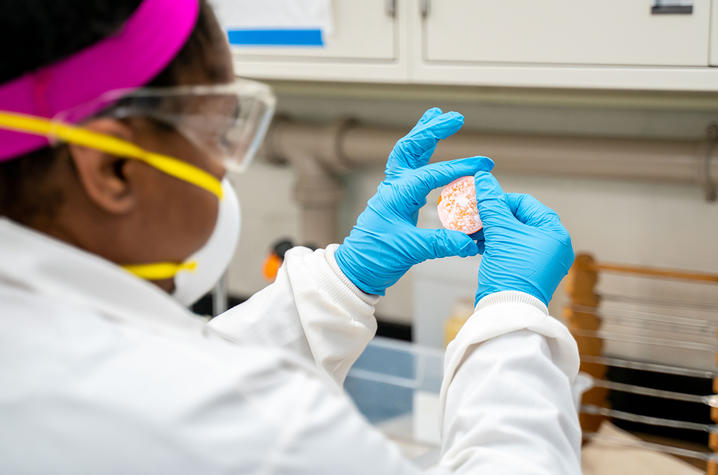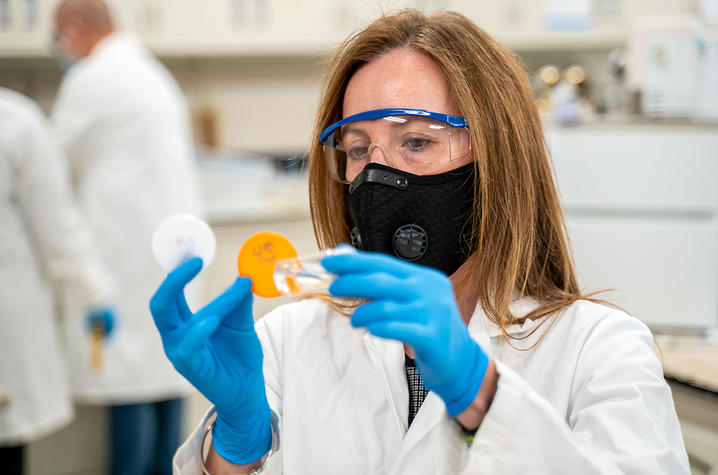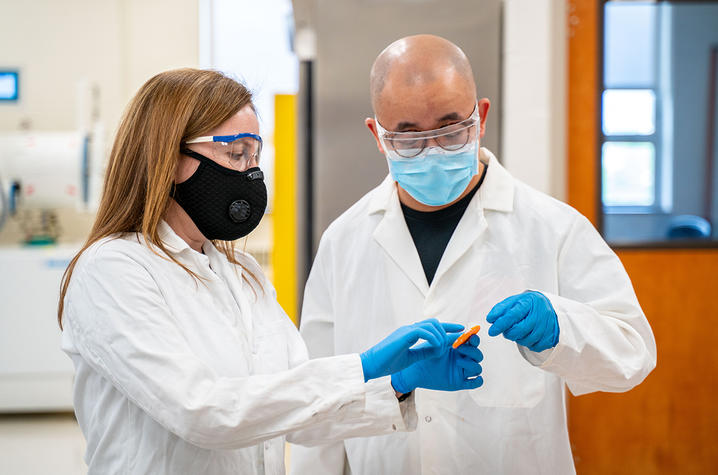UK, SCC Team Up to Confront COVID-19 With Antiviral Membrane, 3D-printed Face Masks
LEXINGTON, Ky. (June 9, 2020) — As the world continues to respond to the COVID-19 pandemic, the University of Kentucky continues its work to confront the virus through innovative research and collaboration.
With funding and support from Kentucky's National Science Foundation (NSF)-sponsored Established Program to Stimulate Competitive Research (EPSCoR), a team from UK and Somerset Community College (SCC) is creating 3D-printed, membrane-filtered face masks that can inactivate the coronavirus. The goal, through passive decontamination, is to not only protect people from breathing in viruses, but to eliminate them on contact.
Isabel Escobar, professor of chemical and materials engineering in the UK College of Engineering and associate director of UK’s Center of Membrane Sciences, is working to perfect the central component of the masks — the filter. This filter will contain a unique membrane composed of a polymer dissolved in a nontoxic, bio-derived solvent, which will then be chemically bound to medical-grade silver nanoparticles, known for their antiviral efficiency.
“The virus is about 120 nanometers in size — in the world of membranes, that's large,” Escobar said. “Even more so, it's not going to come as a virus by itself, flying in the air. It's going to come in the saliva, so it's going to be a much larger particle. A large particle is just not going through (this filter).”
But Escobar’s research takes it a step further, adding the silver nanoparticles for the passive disinfection.
“(The silver nanoparticles) prevent the virus from binding and attaching, and it inactivates,” she said.
Eric Wooldridge, professor of additive manufacturing at SCC, and his team will be providing the substrates, or the structure, of the masks. These substrates, made of polypropylene, will be 3D-printed in a honeycomb pattern to allow for a strong, breathable structure. The antiseptic membranes from Escobar’s team will then line the insides, ultimately creating a safer, cost-effective and environmentally sustainable PPE that would match or exceed N95 mask requirements.
“Utilizing SCC’s additive manufacturing capabilities to produce the base components combined with UK’s groundbreaking nanotechnology to provide the coatings, our goal is to not only demonstrate that it can be done, but that we can rapidly scale production through our KCTCS additive manufacturing network,” Wooldridge said. “This collaboration represents one of the primary goals of the KY NSF EPSCoR program: bridging the gap between theoretical research and practical application to rapidly respond to a need and create solutions that truly matter to the Commonwealth.”
“I love the fact that the 3D-printed supports are from a collaboration with a community college,” Esocbar said. “This shows that without the help of a community college, this project would not have been possible. We are, all together, an intellectual force.”
Escobar, originally from Rio de Janiero, Brazil, has spent the majority of her life working on membrane filtration, with the focus of providing clean water access to the world. When the COVID-19 pandemic hit, Escobar realized her work could also be applied to filtering viruses.
The team's antiviral masks have the potential to positively impact the state, nation and world in response to COVID-19. The collaboration is an example of how KY NSF EPSCoR’s supported researchers have the knowledge base and creativity to pivot their research in the midst of a public health crisis.
“KY NSF EPSCoR is in a unique position to see connections between projects that are unknown to researchers — without their vision, my idea of making passive disinfection face masks using membranes might have stayed as just an idea,” Escobar said. “But thanks to the vision of KY NSF EPSCoR, Eric Wooldridge and I connected and were able to not only develop a short-term plan to make face masks but also develop a long-term plan for research at the forefront of innovation.”
The KY NSF EPSCoR funding comes a month after a similar project at UK was funded by an NSF Rapid Response Research (RAPID) grant. This project, led by UK’s Dibakar Bhattacharyya (known to friends and colleagues as “DB”), also seeks to develop antiviral membrane masks, but through different means. DB, who is director of the UK Center of Membrane Sciences, is a mentor and colleague of Escobar, and actually recruited and brought her to UK in 2015.
“I have to say (DB) is probably one of the people that I respect the most in the world, probably one of the most brilliant minds alive, and he and I spend a lot of time discussing research ideas,” Escobar said. “We have a lot of projects at the Center of Membrane Sciences. We aim to determine how membrane science and technology can help solve problems communities are facing.”
To learn more about the UK/SCC project and Escobar’s work, listen to UK Research’s podcast at https://soundcloud.com/uk-research-media/isabel-escobar-making-green-masks-to-inactivate-covid-19-virus.



As the state’s flagship, land-grant institution, the University of Kentucky exists to advance the Commonwealth. We do that by preparing the next generation of leaders — placing students at the heart of everything we do — and transforming the lives of Kentuckians through education, research and creative work, service and health care. We pride ourselves on being a catalyst for breakthroughs and a force for healing, a place where ingenuity unfolds. It's all made possible by our people — visionaries, disruptors and pioneers — who make up 200 academic programs, a $476.5 million research and development enterprise and a world-class medical center, all on one campus.




